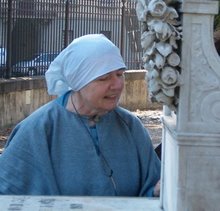Saturday, October 08, 2011
SAINT PARASCHEVA OF IASI
I love their voices. They are gentle voices, talking in Romani, about a saint they love. My Romanian Roma workers today at lunch were telling the story of Saint Parascheva, the narration tumbling out in a mixture of languages, Romani, Romanian, Italian, English, reverently. She was the daughter of a shepherd and sent out to bring food to her father and to others at work. Instead, she gave their food, their bread and wine, to the poor, so that when she got to her father there was nothing left. I asked 'Was she beautiful?' 'Yes, very', replied Bancuta. I asked when had she lived. 'A hundred and fifty years ago, long ago', he replied. Breteanu Bancuta's son is returning to Romania to be there in time for her feast.
They bring her body out of the cathedral at Iasi in Romania on 13th October, now keeping it under glass, and a million pilgrims arrive to touch her and pray.
As soon as I had washed the dishes I went looking for her on the Web, finding that she was from the 11th century, and also finding these images, showing them to Bancuta, who immediately, in great excitement, called Daniel to share them with him.
Then I recorded them retelling her story.
I said that her story is like our story of Santa Zita of Lucca. She was the servant of a rich family, who gave her master's cloak to a naked beggar outside the cathedral, who then, as an angel, returned it to her Master. She also saved a boy from being taken by the devil by beating the devil with her broom.
On her feast day they bring her out in the church of San Frediano and we can visit her in her glass coffin, laying narcissi against the glass and then walking throughout Lucca's streets, with these fragrant bouquets, celebrating this servant.
You can read about her at http://www.umilta.net/zita.html with Frances Alexander's lovely engravings, that John Ruskin admired so greatly.
I love the way these stories transcend time and space, and give us models for ourselves, how their tellers are simple people who completely believe. Magnificat people. Romanian Roma enter our churches, crossing themselves not once, but three times, and touching the floor. In Advent and in Lent they fast strenuously, the last week with no oil, butter, eggs, milk, meat, sweets. A nursing mother does not drink milk on Fridays, nor on that day will a Roma touch iron because of the nails on the Cross. It is an honour to come to know them.
Subscribe to:
Post Comments (Atom)







No comments:
Post a Comment